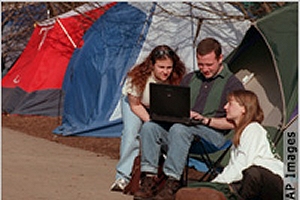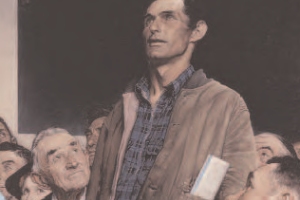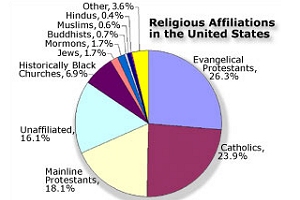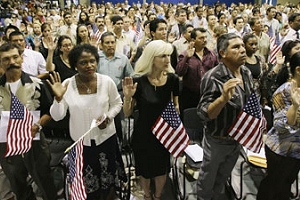America in context
For Many Americans, Hard Work Is Badge of Honor

Americans generally work more hours and take fewer vacations than workers in other advanced economies. But are they enjoying life less?
That question is a matter of considerable debate in the United States, where some say "overwork" means greater stress and more illness and others counter that a "strong work ethic" brings material success to individuals and is a key to the nations economic success.
For advocates of more leisure time, the list of grievances is long. Lois Backon of the Families and Work Institute said long hours have been "a red badge of courage" that show the boss you deserve a promotion. But, she said, long hours reduce workers’ effectiveness and are partly to blame for increases in heart disease and depression.
Economists say Americans work ethic produces substantial rewards. "Americans are a lot better off economically than the Europeans or Japanese," economist Robert J. Shapiro observes in his book Futurecast.
Among the advanced economies, the United States is the only one that does not require employers to provide a minimum number of paid vacation days. While most U.S. businesses typically provide five to 10 days in vacation for new employees and an average of eight paid holidays -- such as Christmas and New Years Day, days on which the business is closed -- government data indicate it takes about 10 years with the same employer to earn three weeks of vacation. The data also show that about 10 percent of full-time workers do not get any paid vacation days.
In contrast, workers in the European Union can count on a minimum of 20 days of paid leave every year, and most get substantially more than that. When paid leave and paid holidays are combined, workers in many EU countries enjoy a minimum of 30 or more paid days off every year. They often get more. The World Tourism Organization pegs average vacation time at 42 days a year in Italy, 37 days in France and 35 in Germany. It says Japanese and South Korean workers enjoy 25 days off every year.
WHEN ITS TOUGH TO TEAR ONESELF AWAY
Whats more, a quarter or more of American workers dont use all of the leave time they have coming.
Twenty percent of Americans do some work even while they are on vacation, according to the Families and Work Institute. Thanks to the proliferation of mobile phones and e-mail devices, many workers, especially senior managers, check in with their offices routinely during non-work hours. "It’s harder and harder to tell what is work and what is leisure," said Cheryl Russell, an independent demographer who studies social trends.
Some Americans check their work e-mail accounts while on vacation by using wireless Internet connections. Pat Engel, an executive at Amplify Public Affairs in Washington, is addicted to her Blackberry -- a device that combines cell phone and Internet access. "I never let it out of my possession," she said, explaining that her clients expect her to be available at all hours and during vacations.
"[Clients] e-mail me at 10 p.m. I e-mail back my answer, and at midnight, they e-mail a thanks back," Engel said. "Sometimes I turn it off during religious services, but its right back on when the service is over."
John de Graff, founder of Take Back Your Time, an advocacy group that wants Congress to mandate three weeks of paid leave each year, said Americans suffer from "time poverty."
"Americans feel enormous pressure to work so they won’t be seen as slackers," de Graaf told America.gov. He said Americans would be better off if they swapped some productivity for more time off and cut their consumption of material goods.
American workers also work longer work weeks and put in more hours over the course of the year than counterparts in many advanced economies. About 80 percent of Americans work 40 hours or more each week; fewer than half of Danes, Finns, the French or Germans work that many hours, according to the International Labor Organization (ILO). On an annual basis, the ILO says, Americans spend about 1,800 hours a year at work, compared to 1,600 hours or fewer in Belgium, Denmark, France, Germany, the Netherlands and Sweden. (Americans take it easy compared to South Koreans, however, who work about 2,400 hours every year.)
REAL BENEFITS
Economists note that European economies, when compared to the U.S. economy, create fewer jobs, have higher unemployment that lasts longer, and produce less wealth.
For example, unemployment rates in France and Germany have hovered near or above 10 percent in recent years and have been double the U.S. rate at times.
The ILO, in a 2007 report, says the United States leads the world in labor productivity per person employed and that "the productivity gap between the US and most other developed economies continued to widen."
Shapiro, in his recent book on globalization, warns of danger ahead for most EU countries and Japan unless they make their economies more productive. He says current work trends will make it extremely difficult for EU countries to continue to finance their social welfare programs.
"From 1990 to 2005, the combined output of France, Germany, and the United Kingdom, adjusted for inflation, grew about 34 percent -- barely 2 percent a year -- and Japan grew at half that unremarkable rate. Over the same 15 years, the American economy expanded 58 percent," he wrote.
"Europe and Japan seem set on handicapping their future prosperity with ostensible acts of social kindness. … Such regulations are slowly draining the competitiveness of thousands of European businesses," he said.
By Michael Gelb
Special Correspondent
Recently on America in context
John Updike Explores How Art Mirrors America’s Soul
 John Updike, a two-time Pulitzer Prize-winning author whose prolific output of novels, short stories, poems and essays has made him one of the most celebrated American writers now living, is perhaps best known as a chronicler of life in America’s small towns and affluent suburbs. As such, he is a longtime observer of his nation’s quirks, customs and tribal rituals, and an interpreter of a broad cultural landscape that defines the United States as surely as its geography does.
John Updike, a two-time Pulitzer Prize-winning author whose prolific output of novels, short stories, poems and essays has made him one of the most celebrated American writers now living, is perhaps best known as a chronicler of life in America’s small towns and affluent suburbs. As such, he is a longtime observer of his nation’s quirks, customs and tribal rituals, and an interpreter of a broad cultural landscape that defines the United States as surely as its geography does.
U.S. Religious Landscape Is Marked by Diversity and Change
 Religious affiliation among U.S. residents best can be described as "diverse and extremely fluid," according to a new poll conducted by the Pew Forum on Religion and Public Life.
Religious affiliation among U.S. residents best can be described as "diverse and extremely fluid," according to a new poll conducted by the Pew Forum on Religion and Public Life.
American Identity: Ideas, Not Ethnicity
 Since the United States was founded in the 18th century, Americans have defined themselves not by their racial, religious, and ethnic identity but by their common values and belief in individual freedom.
Since the United States was founded in the 18th century, Americans have defined themselves not by their racial, religious, and ethnic identity but by their common values and belief in individual freedom.